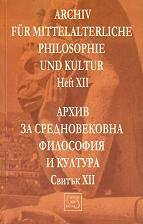Georgios Gemistos-Plethon’s Dependence on Thomas Aquinas’ 'Summa contra Gentiles' and 'Summa Theologiae'
Georgios Gemistos-Plethon’s Dependence on Thomas Aquinas’ 'Summa contra Gentiles' and 'Summa Theologiae'
Author(s): John A. DemetracopoulosSubject(s): Philosophy
Published by: Издателство »Изток-Запад«
Keywords: Georgios Gemistos-Plethon; Thomas Aquinas; Summa contra Gentiles; Summa Theologiae; medieval philosophy; Byzantine Philosophie; theological method; fideism; philosophical method; neoplatonism; scholasticism
Summary/Abstract: In a recent Modern Greek handbook of Byzantine philosophy we read: «The translation of Aquinas’ writings into Greek came too late to seriously influencethephilosophicalthoughtinByzantium»; nothwithstanding the elaboration of some Greek translations of Latin works, «Byzantium remained rather closed to the West». Nihil falsius! On the contrary, apart from the fact that the aube of the 14th century, when the firsttranslationofseveralpartsofsomeofAquinas’ works appeared, is just a few decades away from Aquinas’ (1225-1274) death, these statements reflectthestatus quaestionis of the 40s; they stem from the out-dated book of B.N. Tatakis, La philosophie byzantine, especially from its ideological bias of despising the “Latin West” in favour of what the author called nationalistically the “Greek East”. Nowadays, the influenceoftheGreektranslationsofLatinworks on Late Byzantine philosophy and theology is increasingly acknowledged by scholars. As cumulative evidence shows, Byzantine authors who greatly benefitedfrommajorworksbyfamousWesternthinkers (such as Augustine, Boethius, Anselm and Thomas Aquinas) translated into Greek are to be found not only among the pro-Latin circles (Demetrios Cydones, Prochoros Cydones, Manuel Calecas, Bessarion, Andreas Chrysoberges etc.) and among the circles of open-minded thinkers (such as Nicholas Cabasilas) who did not express any hostility to the West. As a matter of fact, even professed anti-Latin authors (such as Gregory Palamas, John Cantacuzenos, Joseph Bryennios, Marcos Eugenicos, and Scholarios) did not deprive themselves of reading Western authors and borrowing from them whatever they regarded as sensible and useful.
Journal: Архив за средновековна философия и култура
- Issue Year: 2006
- Issue No: 12
- Page Range: 276-341
- Page Count: 66
- Language: English
- Content File-PDF

